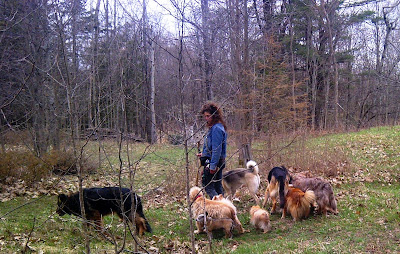Is Your Dog or Cat Over Inoculated?
 |
In this article:
- Defining Core Vaccines v.s. Non-Core Vaccines
- Core Vaccines - Updated Guidelines
- Non-core Vaccines - Does your Dog or Cat Really Need One?
- How Does a Vaccine (Inoculation) Work?
- What is in a Vaccine? Beside Antibodies?
- Rabies Vaccines Ingredients
- The Serious Health Risks of Over Inoculation
- Your Best Defense Is
1.0 Defining Core Vaccines v.s. Non-Core Vaccines
Core Vaccines
The American Animal Hospital Association (AAHA) define core vaccines (inoculations) as:
These diseases are present in all areas within North America and are more easily transmitted than non-core diseases.
Non-Core Vaccines
The AAHA defines non-core vaccines as:
- Bordetella
- Canine Adenovirus (intransal)
- Canine Coronavirus
- Canine Influenza
- Canine Parainfluenza
- Leptospirosis
- Lyme Disease
2.0 Core Inoculations - Updated Guidelines
The AAHA's updated guidelines issued in 2011 (includes the US and Canada):
- Recommends that canine vaccination be done every three (3) years.
- In their guidelines, the AAHA also admits and acknowledges that immunity for vaccinations extends beyond the three year horizon.
- Core inoculations such as:
- Distemper and Parvo are good for 5 or more years.
- Ardenovirus is good for 7 years.
- Rabies is the only inoculation mandated by law.
- Check your local bylaws to confirm the law for your area, as some require the rabies be administered every 1 year, 2 years or 3 years.
Although this new 3-year protocol is taught in Veterinary Science schools, the majority (the number currently sits at about 60%) of practising conventional veterinarians as well many integrative and 'holistic' veterinarians continue to recommend annual re-vaccinations.
If your veterinarian is still pushing you to re-vaccinate your dog or cat on an annual basis you should:
- Ask them to do a titer test to measure your dog or cat's current level of immunity.
If your dog or cat was vaccinated when she was a puppy or kitten, she is likely protected for life from core diseases. The only exception to this rule (in a legal sense, not in an immunity sense) is rabies. The province or state in which you reside sets the protocol for rabies inoculations. For an example of a government mandated rabies protocol you can check this one for Ontario Canada.
NO. Non-core vaccines are not required.
Diet plays a key role in protecting your dog and cat from illness and disease...
For example, just because your dog is around standing water does not mean he/she will acquire Leptospirosis.
If your dog's immune system is fully supported, your dog's body can normally and naturally fend-off such threats.
However, if your dog's diet does not consist of species appropriate food, and instead contains fillers including corn and other grains, chemical preservatives, genetically modified food, etc. your dog will not have the natural defense system required to protect.
Support your dog and cat's health with a species appropriate diet and a natural health regimen.
4.0 How Does A Vaccine (Inoculation)Work?
A vaccine is supposed to protect your dog or cat from potentially fatal infections by disease causing (pathogenic) viruses (i.e. distemper). The vaccine contains a killed virus or modified (non-pathogenic) live virus. This is intended to stimulate your dog or cat's immune system to recognize and fight that particular virus. After the vaccination your dog or cat's immune system should then be able to produce his/her own antibodies to fight the virus.
During the period just after vaccination your dog's and cat's immune system is suppressed as it fights to acclimatize itself to the foreign antibodies. During this time the immune systems normal ability to reject common bacteria, fungus, parasites and viruses may be seriously hampered. This can result in increased susceptibility to acute or chronic infections, for example:
- Ear infections
- Eye Infections
- Urinary tract infections (UTIs)
- Feline leukemia in cats
- Other chronic conditions including:
- Arthritis
- Cancer
- Kidney Disease
- etc.
If your dog is suffering from a chronic condition or disease you really need to think twice before re-inoculating your dog or cat as her weakened condition may not support the further assault on the immune system caused by vaccinations.
Vaccines contain more than the active antibodies. Vaccines contain many substances that can wreak havoc on your companion animals' health....
- The vaccine adjuvant aluminum hydroxide (associated with causing neurological disease)
- Chemical preservatives which can also be endocrine disrupting and carcinogenic)
- Foreign proteins
- Immune irritants
- Mutated bacteria
- Viruses
6.0 Rabies Vaccine Ingredients
Depending on the rabies vaccine selected there are some variation in components.
Rabies vaccine ingredients include:
- Aluminum hydroxide (antacid)
- Amphotericin B (anti-fungal)
- Chlortetracycline (antibiotic)
- Disodium edetate (preservative)
- Gentamicin (antibiotic)
- Human serume albumin
- Merthiolate (derivative of ethyl mercury)
- Neomycin (antibiotic)
- Ovalbumin (a protein extracted from egg white)
- Rabies virus, killed (rabies virus)
- Sodium chloride (iodized salt)
- Sodium O(ethylmercurithio) benzoate (derivative of ethyl mercury)
- Sucrose
- Thimerosal (derivative of ethyl mercury)
- Trometamol (NSAID)
The ingredients in the rabies vaccine can cause a variety of health issues (as noted in the article further above.
For example:
- Aluminum hydroxide causes neurological issues.
- Mercury and mercury derivatives (e.g. thimerosal) damage: organs, immune system, neurological system, cause cell mutation, tumors and cancer.
7.0 The Serious Health Risks of Over Inoculation
Over-inoculation comes with a considerable risk of major adverse health issues such as those encapsulated under the term Vaccinosis.
7.1 Vaccinosis includes:
- Mild adverse reactions to vaccination
- Severe adverse reactions
- Illness
- Long-term damage
- Death
7.2 The following are some of the mild adverse reactions caused by vaccines and vaccination:
- Conjunctivitis
- Fever
- Flu-like symptoms
- Hair change
- Hair loss
- Inflammation and swelling at the injection site
- Lethargy
- Loss of appetite
- Sneezing
- Stiffness
- Soreness
- Oral Ulcers
7.3 The following are some of the severe adverse reactions
vaccines and vaccination
vaccines and vaccination
- Allergic hypersensitivity
- Allergic uveitis
- Anaphylactic shock
- Behavioural change
- Granulomas and abscesses
- Hives
- Lameness
- Swelling of the face
- Swelling on the torso
- Neurological damage
- Respiratory diseases
- Vitiligo
- Weight loss
- In breeding females – reduction of milk production
7.4 Examples of Serious Health Issues caused by vaccines and
vaccination:
- Abortion – spontaneous
- Anaphylaxis
- Autoimmune arthritis
- Blood disorders, including:
- Autoimmune Hemolytic Anemia
- ITP
- Congenital abnormalities in foetus
- Encephalitis
- Fetal (embryotic) Death
- Hypertrophic Osteodystrophy
- Infertility
- Myocarditis
- Polyneuritus
- Seizures
- Tjyroiditis
- Cancer - Injection-site sarcomas
8.0 Your Best Defense Is...
8.1 Knowledge
Don't allow your veterinarian to push you into annual re-inoculations. If you are concerned about immunity levels ask your veterinarian to do a titer test.
8.2 Diet
Support your dog and cat's system from the inside. Feed your dog and cat a species appropriate raw or gently cooked and fresh food diet.
Learn about a species appropriate diet:
- Go to this article.
8.3 Use of Chemical-Based Insect, Parasite Preventatives
Don't
Chemical
based insect and parasite preventatives are powerful pesticides that are toxic
and carcinogenic – they tax the immune system, the renal system and more. You can
read more about that here.
Do
Holistic Diet, Nutrition, Wellness Services Tailored to Your Individual Dog and Cat
For information about my holistic diet, nutrition, wellness services visit my:
Maintain good health | Address acute and chronic health issues | Pre and post surgery support and recovery
My holistic wellness services are available worldwide via video consultation.
🌎 USA | Canada | UK | Europe | Australia | New Zealand | Asia | South and Central America | Africa | UAE
📱 FaceTime | Facebook | Skype | WhatsApp
Holistic Behavioral Services For Your Dog
For information about my holistic behavioral services visit my:
For dogs of all ages, sizes and breeds
My holistic behavioral services are available locally in-person and worldwide via video session.
🌎 USA | Canada | UK | Europe | Australia | New Zealand | Asia | South and Central America | Africa | UAE
📱 FaceTime | Facebook | Skype | WhatsApp
Affiliations to Companies
✓ None.
✓ I don't sell food or supplements.
✓ I'm not aligned with any companies.
✓ None.
✓ I don't sell food or supplements.
✓ I'm not aligned with any companies.
Article and graphics by Karen Rosenfeld









